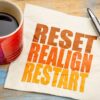
Why this belief might be holding you back (and how to change the narrative).
“I’m just not good with money.”
It’s a phrase many people repeat with total conviction. They say it with resignation, as if it were a permanent condition — like being good with money is some natural talent you either have… or don’t.
But have you ever stopped to ask yourself: what does that actually mean?
Does it mean having savings?
Not having debt?
Earning more than you spend?
Investing in stocks or crypto?
If you ask ten people what “being good with money” means, you’ll probably get ten different answers.
It’s not a clear concept — but it’s definitely a demanding one.
The Rigid Financial Model We’ve All Been Sold
For years, we’ve been told that a financially responsible person must:
- Have a flawless monthly budget
- Avoid all debt
- Save at least 20% of their income
- Never spend on “non-essentials”
- And fully understand how the markets work
But let’s be honest — very few people live like this. And yet, if we fall short of that ideal, we feel like we’ve failed.
That’s the first lie: that there’s only one “right” way to manage money.
The Problem with Believing You’re “Bad with Money”
Thinking you’re bad with money isn’t just a passing thought. It becomes a barrier. And without even realizing it, that belief might be holding you back:
- You avoid asking questions for fear of sounding ignorant
- You put off big decisions out of shame
- You stay away from opportunities because you “don’t feel ready”
It’s like thinking you have to already be fit before joining a gym. It just doesn’t make sense.
Nobody is Born Knowing This Stuff
Here’s the truth: very few people receive solid financial education.
Not in school. Often not at home. And definitely not at the bank, where the language is complicated and the terms are full of fine print.
So really — where were you supposed to learn it?
Believing you should already know everything is not only unfair… it’s counterproductive.
Because what really matters isn’t how much you know. It’s how willing you are to learn.
So What Does it Mean to Be “Good with Money”?
Let’s redefine it.
Being good with money doesn’t mean having it all figured out. It means being able to:
- Be consistent instead of perfect
- Make informed decisions, even small ones
- Know when (and where) to seek trustworthy advice
- Learn what you don’t yet know, without guilt or shame
- Look at your situation honestly, without denial or sugarcoating
Someone who has debt but is looking to restructure it…
Someone who’s preparing ahead of a mortgage renewal…
Someone who talks to an advisor to understand their options…
That’s real financial progress.
Because imperfect action is almost always more powerful than “cautious” inaction.
What if You Changed the Story?
A lot of people think they need to “get everything in order” before they can even consider buying, investing, or refinancing.
But in reality, that order often comes after the decision — not before.
For example:
- Someone who thinks they “can’t qualify for a mortgage” because they’re self-employed may discover there are specialized products for their situation.
- Someone who believes it’s “too late to invest” because they’re over 50 might benefit from tailored strategies for their life stage.
- Someone with no savings but steady income may still find a clear, realistic path forward.
But for any of that to happen, the conversation needs to shift.
It’s not about whether you’re good or bad with money.
It’s about whether you’re ready to make more conscious choices.
And if you’re not ready yet… it’s about figuring out what would help you get there.
How to Move Forward — Even if You Don’t Feel Ready
- Accept that zero risk doesn’t exist:
Every financial decision — a purchase, investment, or refinance — carries some level of uncertainty. The goal isn’t to eliminate risk. It’s to manage it. - Get informed, but set a limit:
Research is helpful, but if you’ve been reading for weeks and haven’t taken action… you probably don’t need more data. You need clarity. - Talk to someone who knows:
Fear often comes from not seeing the full picture.
At UCC Mortgage Co., we’re here to help you organize your thoughts, understand your options, and evaluate real-life scenarios — no pressure, no fine print. - Start with something small:
Review your credit score. Explore what you might qualify for.
Small actions like these can give you the clarity you need.
Final Thoughts
Being “good with money” isn’t a requirement you must meet before you begin.
It’s a path you walk — one step at a time.
And at UCC Mortgage Co., we’re ready to walk it with you.








